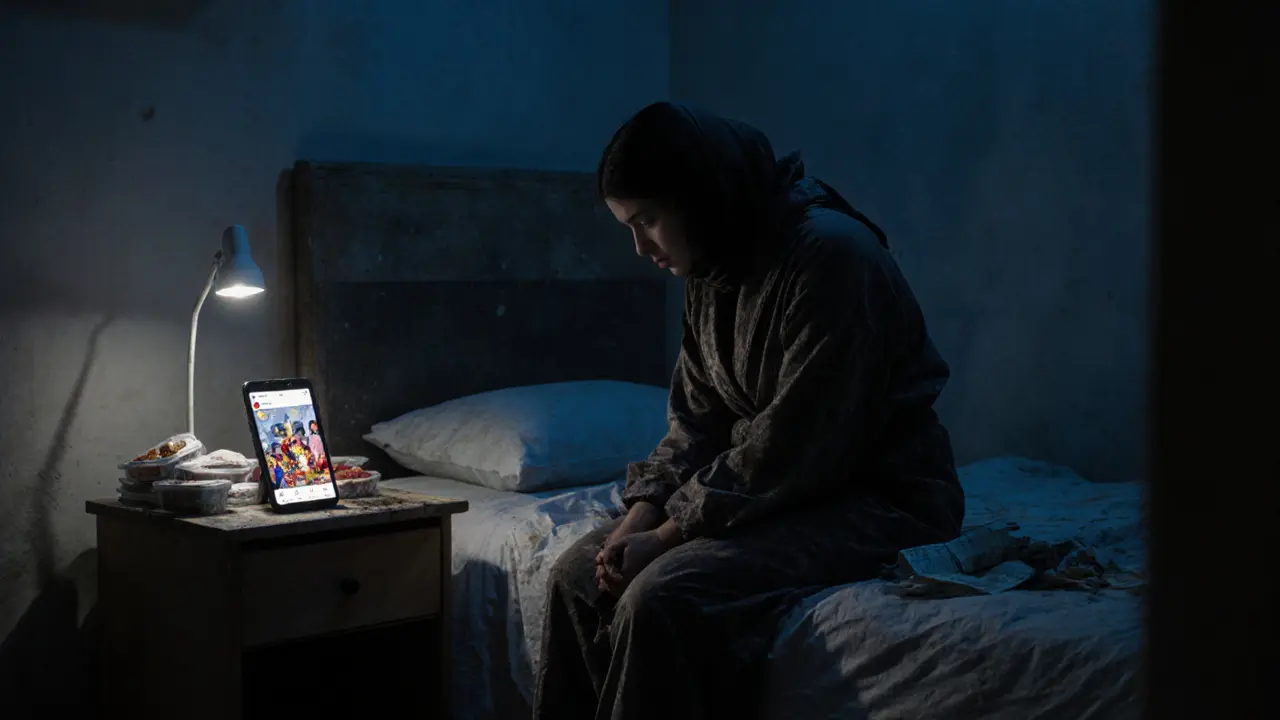Living as a sex worker in Dubai isn’t about luxury apartments and designer clothes like some movies show. It’s about surviving in a city where every step carries legal risk, social shame, and constant fear. There are no licenses, no protections, no unions. Just silence, isolation, and the daily pressure to stay one step ahead of the law.
Legal Peril Is Always Nearby
Dubai’s laws don’t recognize sex work as a job. It’s illegal under Article 357 of the UAE Penal Code, which criminalizes prostitution and solicitation. Even exchanging money for sex without a formal contract can land someone in jail. Police raids happen without warning-sometimes at apartments, sometimes at hotels, sometimes even at home. A single tip-off from a disgruntled client or neighbor can end everything.
Many women are arrested during routine traffic stops or hotel inspections. Once detained, they’re held in immigration centers while authorities decide whether to deport them. For foreign workers-most of whom come from the Philippines, Ukraine, Russia, or Nigeria-deportation means losing everything: savings, contacts, even their visas. Some are banned from re-entering the UAE for life.
No Safety Net, No Backup Plan
There’s no healthcare system for sex workers. No worker’s compensation. No mental health support. When someone gets sick-whether from an STI, a violent client, or just exhaustion-they either pay out of pocket or go untreated. Clinics won’t ask questions, but they won’t help either unless you have insurance. Most don’t.
Many women work through pain. A broken rib from a client, an untreated urinary tract infection, depression from sleepless nights-they all get ignored. One woman, who asked to remain anonymous, told me she skipped her HIV test for six months because she couldn’t afford the $150 fee. She said, “If I get sick, I can’t work. If I can’t work, I can’t eat. So I pretend I’m fine.”
Isolation and Social Death
Family ties often break the moment someone enters this work. Parents disown their daughters. Siblings stop answering calls. Friends vanish. In many cases, women are cut off completely. Some use fake names. Others lie about their jobs, saying they’re “event planners” or “freelance consultants.”
The loneliness is crushing. No one to celebrate a birthday. No one to call when you’re scared. Many women live alone in small, rented rooms with no windows. They spend hours scrolling through social media, watching videos of people living normal lives-going to school, meeting friends, traveling home for holidays. They know they can’t do that anymore.

Dependence on Middlemen and Scams
Most women don’t work alone. They rely on fixers-people who find clients, arrange meetings, and collect payment. These middlemen often take 40% to 70% of earnings. Some promise protection. Others threaten violence if you don’t comply. A few run fake agencies, taking deposits from women who think they’re getting a “job placement,” then disappearing with the money.
One woman from Moldova paid $3,000 to a “recruiter” in Kyiv for a “modeling job” in Dubai. When she arrived, she was handed a list of clients and told to start working. She had no contract, no ID, no way out. She worked for 14 months before she escaped. She still owes the agency $2,000 they claim she “borrowed” for her flight.
Client Abuse and No Recourse
Violence is common. Clients who refuse to pay, who demand unsafe acts, who hit or threaten-there’s nowhere to turn. Calling the police is not an option. Reporting abuse means admitting to a crime. Many women carry pepper spray or a phone with a hidden recording app. Some use code words with trusted contacts: “I’m at the mall” means “I’m in danger.”
One woman described being held against her will for three days by a client who locked her in a hotel room. She escaped by pretending to be sick and begging the front desk for a doctor. The staff called an ambulance, not the police. She was taken to the hospital, treated, and released-no questions asked. She never went back to that hotel.
Financial Instability and Debt Traps
Income is unpredictable. One week you make $3,000. The next, you make $300. Clients cancel last minute. Prices drop when new women enter the market. Some women are forced to take more clients than they can handle just to pay rent.
Many borrow money from other workers or fixers to cover basic needs: rent, food, phone bills. Interest rates can hit 20% per week. If you fall behind, your name gets passed around. Other clients avoid you. Fixers cut off access. You’re trapped.
One woman from Brazil said she owed $5,000 after two years. She worked 12-hour days, seven days a week, just to pay interest. She never paid down the principal. “I’m working to pay for the privilege of working,” she told me.

What Happens When You Try to Leave?
Getting out is harder than getting in. Without savings, documentation, or family support, there’s nowhere to go. Some try to return home, but their passports are often confiscated by fixers. Others apply for asylum, but the process takes years-and they’re not allowed to work during that time.
A few NGOs in Dubai offer help, but they’re underfunded and understaffed. Most women don’t know they exist. Those who do are afraid to reach out. They’ve been told, “If you talk, they’ll deport you.”
One woman managed to escape and got into a shelter run by an international group. She spent six months learning English, getting her documents sorted, and applying for a humanitarian visa. It took three attempts before she was accepted into Canada. She’s now studying nursing. But she still wakes up screaming sometimes.
Why This Isn’t Talking About “Luxury” or “Glitz”
Media often portrays sex work in Dubai as glamorous-expensive cars, private villas, high-end clients. That’s a tiny fraction of the reality. Most women live in studio apartments in Deira or Bur Dubai. They use public transport. They eat at cheap food stalls. They save every dirham because they know it could be their last paycheck.
The truth is, most entered this work out of desperation: a sick parent, a debt back home, a failed visa, a broken marriage. They didn’t choose this life because they wanted to. They chose it because they had no other options.
What Needs to Change
Legalization won’t fix everything, but it would help. Decriminalization would let women report abuse without fear. It would give them access to healthcare, banking, and housing. It would stop fixers from holding them hostage.
Right now, the system treats them as criminals, not people. And until that changes, the daily struggles won’t stop. They’ll just get quieter.
Is sex work legal in Dubai?
No, sex work is illegal in Dubai under UAE law. Both the person offering sex and the person paying for it can be arrested. There are no legal protections, no licenses, and no recognized rights for sex workers. Even private, consensual exchanges are considered criminal offenses.
What happens if a sex worker is arrested in Dubai?
If arrested, the person is usually held in an immigration detention center. Foreign nationals are often deported after a short detention, sometimes without a trial. Their passports may be confiscated. Many are banned from re-entering the UAE permanently. Local women may be held longer while authorities contact family or arrange shelter.
Do sex workers in Dubai have access to healthcare?
No formal healthcare access exists. Some clinics offer anonymous STI testing for a fee, but most workers can’t afford it. Many avoid medical care entirely due to fear of being reported or losing income. Mental health support is virtually nonexistent. Emergency care is available if someone is hospitalized, but follow-up treatment is rarely provided.
How do sex workers in Dubai find clients?
Most rely on middlemen or “fixers” who connect them with clients through WhatsApp, Telegram, or private websites. Some use social media under fake profiles. A few work through hotels or short-term rentals arranged by third parties. Word-of-mouth among other workers is common, but trust is low and betrayal is frequent.
Can sex workers in Dubai leave this line of work?
Yes, but it’s extremely difficult. Many lack savings, documentation, or family support. Some are trapped by debt to fixers. Others fear deportation or retaliation. A small number receive help from NGOs or international organizations, but resources are limited. Leaving often requires relocating to another country, which can take years of paperwork and legal battles.

Tiberius Knightley
My name is Tiberius Knightley, a seasoned escort with unparalleled expertise in this thrilling industry. My passion for my profession has led me to explore various cities and cultures as I continue to provide my clients with the best experiences. In my free time, I enjoy writing about my adventures in different cities, focusing on the unique aspects of each place from an escort's perspective. My work aims to not only entertain but also provide valuable insights into the world of high-class companionship. Follow my journey as I uncover the hidden gems and fascinating stories from the cities I visit, all while sharing my expertise in the art of escorting.
view all postsWrite a comment